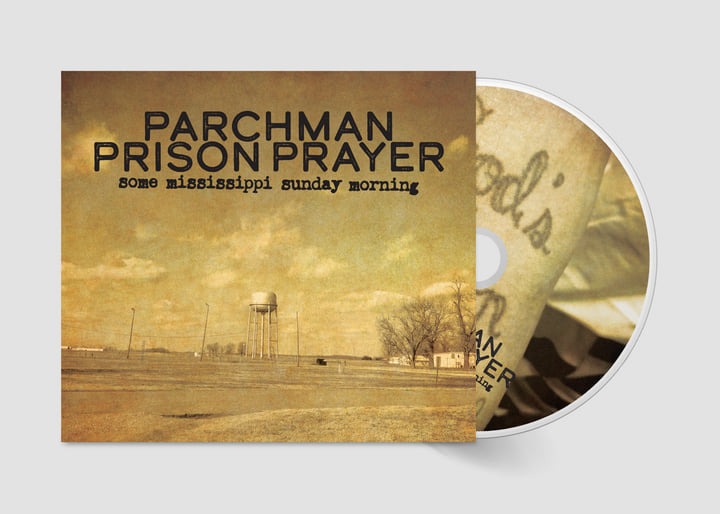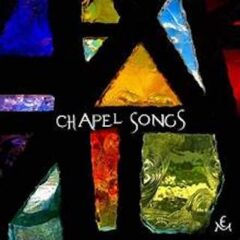
By Robert M. Marovich
‘…hopeful songs sung in a setting of hopelessness…’
PARCHMAN PRISON PRAYER: SOME MISSISSIPPI SUNDAY MORNING
Various Artists
Glitterbeat (2023 release)
After three years of wading through bureaucratic red tape and then only given a little more than one week’s notice to pack his gear and fly to Mississippi, Grammy Award-winning producer Ian Brennan at last had the permission he needed to spend a few hours recording the singing of inmates at the historically notorious Parchman State Prison.
Opened in 1901, the Mississippi State Penitentiary, aka Parchman Farm, has been the place of confinement for such notable musicians as Son House and Bukka White. White wrote and recorded “Parchman Farm Blues” for OKeh in 1940. It has also come under scrutiny for having one of the highest prisoner mortality rates in the nation and for ongoing riots. Jay-Z famously filed a class action suit on behalf of the inmates due to the “abhorrent” and “barbaric” conditions.

‘Break Every Chain,’ Tasha Cobbs Leonard’s breakout hit as performed by M. Kyles on Parchman Prison Prayer: Some Mississippi Sunday Morning
Like a modern-day Alan Lomax, Brennan arranged his recording apparatus and microphone, and invited inmates of the 122-year-old institution who ministered at the prison’s Sunday worship services to step forward and offer a song. Though initially reluctant, one by one they came forward, young and old (28 to 73 years of age), Black and white. Some sang more contemporary gospels, such as M. Kyles, who performed Tasha Cobbs Leonard’s breakout hit “Break Every Chain,” and L. Brown, who covered Hillsong United’s “Hosanna.” Several participants joined in as an anonymous singer/pianist sang a rendition of William McDowell’s “I Give Myself Away.”

‘Jesus, Every Day Your Name is the Same,’ a song popularized by Shirley Caesar, with lead vocal by C.S. Deloch with choir, on Parchman Prison Prayer: Some Mississippi Sunday Morning
Some sang a cappella, and most every voice was tuneful and convicted, with only a few pitchy notes here and there. Fellow inmates accompanied N. Peterson’s “Step Into the Water” with rhythmic handclapping. Likewise, twenty-nine-year-old L. Stevenson sang “I Gotta Run” to handclapping and some improvised bass doo-wopping in the background. Perhaps that basso was M. Palmer, age 60, whose well-below-sea-level voice on “Solve My Need” sounds like it is echoing off the earth’s core. It is the album’s most ethereal cut. “Locked Down, Mama Prays for Me” is a combination song/rap courtesy of Mr. Robinson and A. Warren. D. Thomas’s version of the Williams Brothers’ “I’m Still Here” evokes participatory singing from the makeshift gathering.
The album’s real treat is when the inmates form an informal choir and, to drums, organ, and bass, sing “Jesus, Every Day Your Name is the Same,” a song popularized by Shirley Caesar; and Lee Williams and the Spiritual QCs’ “If I Couldn’t Say One Word.” A vivacious version of the congregational favorite “Lay My Burden Down,” complete with vocals from C. S. Deloch—at 73, the oldest participant—and mighty piano work pulls everyone into the mix.

‘If I Couldn’t Say One Word, I’ll Just Wave My Hand,’ popularized by Lee Williams and the Spiritual QCs, lead vocal here by L. Brown with unidentified backing group, as heard on Parchman Prison Prayer: Some Mississippi Sunday Morning

‘Locked Down, Mama Prays for Me,’ lead vocals by J. Robinson and A. Warren, as heard on Parchman Prison Prayer: Some Mississippi Sunday Morning
The starkness of Parchman Prison Prayer as well as the brevity of many of the tunes (I wish we could have heard more), evoke the desolation of incarceration. The juxtaposition of hopeful songs sung in a setting of hopelessness speaks to the resilience of humankind. Just as flowers grow through the cracks of concrete, so some light and life can be found in the most debilitating of environments. This may be the most haunting, the most refreshingly informal, and the most moving album you encounter this year. That was some Mississippi Sunday morning.
All profits from the album will benefit the Mississippi Department of Corrections Chaplain Services.
Picks: “If I Couldn’t Say One Word,” “Lay My Burden Down,” “Solve My Need.”
***
 A worship service conducted at arena-level volume and intensity…
A worship service conducted at arena-level volume and intensity…
THE JOURNEY
Todd Dulaney
MNRK Music Group (2023 release)
On his latest album, The Journey, worship leader and Chicagoland resident Todd Dulaney continues to deliver P&W selections steeped in Biblical wisdom. The album, recorded live at Chicago’s Calvary Baptist Church in 2022, brings the communal modern worship experience into the listener’s own sacred space.
What’s immediately noticeable is how Dulaney’s voice is deeper, matured, more oaken. The consistent background vocalists play congregation to Dulaney’s minister. Whether the songs are slow ballads or move at a quicker tempo, the overall atmosphere of The Journey is of a worship service conducted, with few exceptions, at arena-level volume and intensity.

“No Weapon,’ Todd Dulaney, from The Journey

‘It Won’t Work Flow,’ a continuation of ‘No Weapon,’ Todd Dulaney, from The Journey
The album opener, “No Weapon,” takes its text from Isaiah 54:17 (“No weapon formed against thee shall prosper”), then shifts seamlessly into “It Won’t Work Flow.” The reprise picks up on the scripture and develops, as frequently happens at a worship service, into something of a sacred jam session. This two-part rumination on God’s protection exceeds fourteen-minutes as Dulaney exhorts the audience to keep the faith. It would have been just as effective, however, had the flow been limited to ten minutes, on record, at least.

‘I Lift My Eyes,’ based on Psalm 121, Todd Dulaney, from The Journey
“Greater,” featuring Tim Godfrey, is a melodic celebration of the name of Jesus. It follows in the thematic footsteps of Dulaney’s 2018 “Your Great Name,” while “I Lift My Eyes,” based on Psalm 121, is a handsome introspective ballad and the album’s best selection. Dulaney explores his upper vocal range on the latter, though not without some aural hints of vocal fatigue, likely the product of a long and arduous recording session. The track also receives an extended reprise, this one called “My Help Flow.” Like “No Weapon,” “My Help Flow” is an extended musical exchange between Dulaney and his BGVs on the Lord’s protection. The live audience sings along with the artists during an a cappella segment.
“Great Things” is contemporary gospel with a traditional lyric. Darrel Walls sings, “Thought I wouldn’t make it/But you did it again.” The BGVs build the tension by harmonizing high above the stave. This track, too, leads to a reprise, though it is not as long as its antecedents.

‘It’s Working,’ Todd Dulaney, featuring Bishop Hezekiah Walker, from The Journey
With a drone-like melody, the uncomplicated “Lord I Love You” turns down the temperature and decibel level momentarily, as Dulaney encourages the audience to settle into worship mode. Bishop Hezekiah Walker assists on the current charting single, “It’s Working.” He and Dulaney bring the album’s theme of hope and healing full circle by declaring every challenge will work out in the end. And it will or, as John Lennon famously quipped, it’s not the end.
Notwithstanding its single releases, The Journey is best enjoyed in one sitting. Fans of P&W and Todd Dulaney in particular will appreciate this latest live outing.
Pick: “I Lift My Eyes”
***
 ‘…prayerfully meditative with acoustic austerity…’
‘…prayerfully meditative with acoustic austerity…’
CHAPEL SONGS
Eddy Mann
Independent (2023 release)
With Chapel Songs, Philadelphia-based Christian folk artist Eddy Mann offers a dozen prayerfully meditative selections with acoustic austerity.
The album is aptly titled. The easy, peaceful songs express the intimacy of an evening chapel service. Examples include the easy-to-learn “Hallelujah,” based on Revelation 19:1 and bathed in exquisite harmonies. “Three Is One” is a relaxed meditation on the Trinity. “Amen” is a lightly bouncy arrangement of the spiritual popularized by Wings over Jordan in the 1940s, by Sidney Poitier in the 1963 film Lilies of the Field, and by the Impressions in 1964.

‘Gracious God,’ Eddy Mann, from Chapel Songs

‘Amen,’ Eddy Mann, from Chapel Songs
The vulnerability in Mann’s voice, well-suited to the material, evokes ambient artists like Low and Sleeping at Last. Everything comes together on “Gracious God,” which has the formality of a hymn but with an informal smooth jazz arrangement. He gives the same lithe touch to the Sunday School perennial, “This Little Light of Mine,” retitled here as “Let It Shine.”

‘My Alms,’ Eddy Mann, from Chapel Songs
Interpolating a key line from “Solid Rock,” “My hope is built on nothing less/than Jesus’ blood and righteousness,” “Hope of the World” is a praise piece built on pop song construction. And with an intro, rhythm, and chord structure reminiscent of Crosby Stills Nash & Young’s protest anthem “Ohio,” “My Alms” serves as a summary of Mann’s music ministry. “Let my life be my mark,” he sings, “be my mark in this world.”
Chapel Songs has a restful celebratory feel, brimming with understated but earnest optimism. It’s what we need as we enter a new year.
Picks: “Gracious God,” “Hope of the World”


